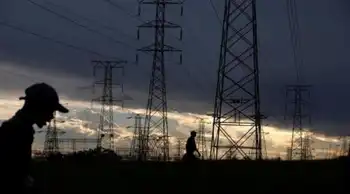Cutting off power to pot growers
Powering marijuana growth indoors isn't a problem for many growers, they just steal the electricity, according to authorities.
So police from the five-county Philadelphia area teamed up with PECO Energy and PP&L for two days this week to learn how to spot indoor marijuana operations using an unusual method: power usage.
Most drug raids are the result of months of police work following up on tips from neighbors or informants. Now the utility companies will join the ranks of police tipsters.
Les Kjemhus, who retired from the Royal Canadian Mounted Police, was on hand at the Bucks County Training Center in Doylestown Township to teach investigators how to spot marijuana growing operations using patterns in electricity use. He had spent the last 15 years teaching the same thing to Canadian police. About 80 local, state and federal officers and 20 utility employees learned the signs that point to power being used or stolen to grow pot.
The training course was organized by the training center and Bucks County detectives and funded by PECO.
Kjemhus said growers use significantly more energy than their neighbors. And, unlike their neighbors, they don't pay for it. They steal it, he said. PECO spokesman Michael Wood said local homes average about 750 kilowatt-hours a month. The number can be four to five times more for indoor marijuana growing operations. They steal power to avoid paying the exorbitant costs, which would cut into their street profits, and to evade notice, Wood said.
When investigators, acting on a neighbor's tip, started looking at 1432 Mink Road in Bedminster earlier this year as being a possible grow house, they noticed that no one appeared to be living there. A 24-hour old snowfall had covered everything: the unshoveled driveway, the car that hadn't been moved in two years, the roof. Well, nearly all the roof. A circular area around a silver fan vent was clear. That, police noted, signified a "large amount of heat emitting from this area."
When police raided the Mink Road house and a second one in Chester County, allegedly run by the same growers, they said they found 1,267 marijuana plants between the two locations. Also in the houses were thousands of dollars worth of powered lights, ventilation and various other pieces of apparatus for the indoor marijuana growing operations, they said. That clear vent sticking up out of the snow-covered roof was pouring the hot air generated by the growing operation out of the house, police said.
To power the vent and sophisticated lighting at the Mink Road house and its cousin in Chester County, the alleged growers, Van Tran Nghiep, 43, and Trung Hung Nguyen, 48, were stealing electricity and lots of it, police said.
Three months after the raids, police added charges of theft of services and risking a catastrophe against the two men.
The pair allegedly stole at least $25,000 worth of electricity during the cops' 3-month investigation. The growers had tapped into a power line in front of the meters, which read the kilowatts used, and ran their own, unmonitored power lines underground and into the basement at both locations, police said.
Philadelphia police raided a North Philadelphia house Thursday and found more than 600 plants worth more than $5 million inside. PECO said it's unclear if the growers were stealing power, but police found at least 35 high-powered grow lamps in the house.
Authorities said there are two ways to recognize a marijuana growing operation by its power usage: unusually high levels of consumption or a flat line. When growers try to hide their usage by tapping into the electricity before it reaches a meter or by tampering with a meter, the usage pattern doesn't change, becoming a flat line, according to technicians. Normal houses fluctuate usage month to month within a reasonable range.
Spiking into a power line can be very dangerous, Kjemhus said. Just recently, firefighters in New Haven, Conn., rushed to an electrical fire and found a home packed with $2.5 million worth of marijuana plants, according to published reports. Officials found the residents had allegedly been stealing power.
Investigators said they charge growers with risking a catastrophe in addition to the theft of services charges because of the hazards of stealing power. Often power stealers use materials that aren't made to carry the currents that utility companies' own materials handle regularly. And it isn't just the technicians who are in danger; in an emergency the power to the building might be cut but the spiked line could still be live, putting firefighters, police and paramedics at risk. And the thieves' shoddy work puts all the neighbors at risk of fire, too.
Wood said three fatal fires since 2007 involved stolen electricity.
PECO doesn't have estimates for this year but, in 2008, PECO's Revenue Protection Technicians found 7,000 cases of theft. Wood said last year the agency billed back revenue from stolen energy totaling $1.8 million, including all thefts not just marijuana growers. But that's just the cases they've found and amounts they can prove, Wood said.
Although the alleged growers in Bedminster and Chester County are charged with stealing nearly $25,000 worth of electricity, police say they likely stole a lot more.
They estimated that in the three years since the houses were last purchased, Nghiep and Nguyen stole about $100,000 worth of electricity for their alleged marijuana operation.
That's a drop in the ocean, or a zap in the line. At a grow operation near Tampa, Fla., earlier this year, investigators found a house had been using about $4,200 a month in stolen electricity, while neighbors' use varied between $120 to $220, according to published reports.
An organization of industry insiders estimates between $4 billion and $6 billion is stolen nationally each year by marijuana growers and others seeking free power. In British Columbia, the utility company estimates about $30 million worth of electric is stolen each year by growers.
Kjemhus said indoor grow houses have been increasing in Canada since the 1970s, but as Canadian authorities have cracked down, the growers have moved south. Nguyen might be an example of that, police said. He has a Canadian driver's license. He'd entered the U.S. in August 2008 by Air Canada airlines and was allowed to stay for a short visit but remained in the country illegally, according to court records.
Nghiep and Nguyen are awaiting trial on the drug, theft of services and risking a catastrophe charges against them.
The trial is tentatively scheduled for December. Both men remain in prison.
Related News

Electricity Grids Can Handle Electric Vehicles Easily - They Just Need Proper Management
NEW YORK - One of the most frequent concerns you will see from electric vehicle haters is that the electricity grid can’t possibly cope with all cars becoming EVs. However, they haven’t done the math properly. The grids in most developed nations will be just fine, so long as the demand is properly management. Here’s how.
The biggest mistake the social media keyboard warriors make is the very strange assumption that all cars could be charging at once. In the UK, there are currently 32,697,408 cars according to the UK Department of Transport. The UK national grid had a capacity of…





